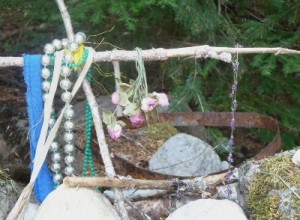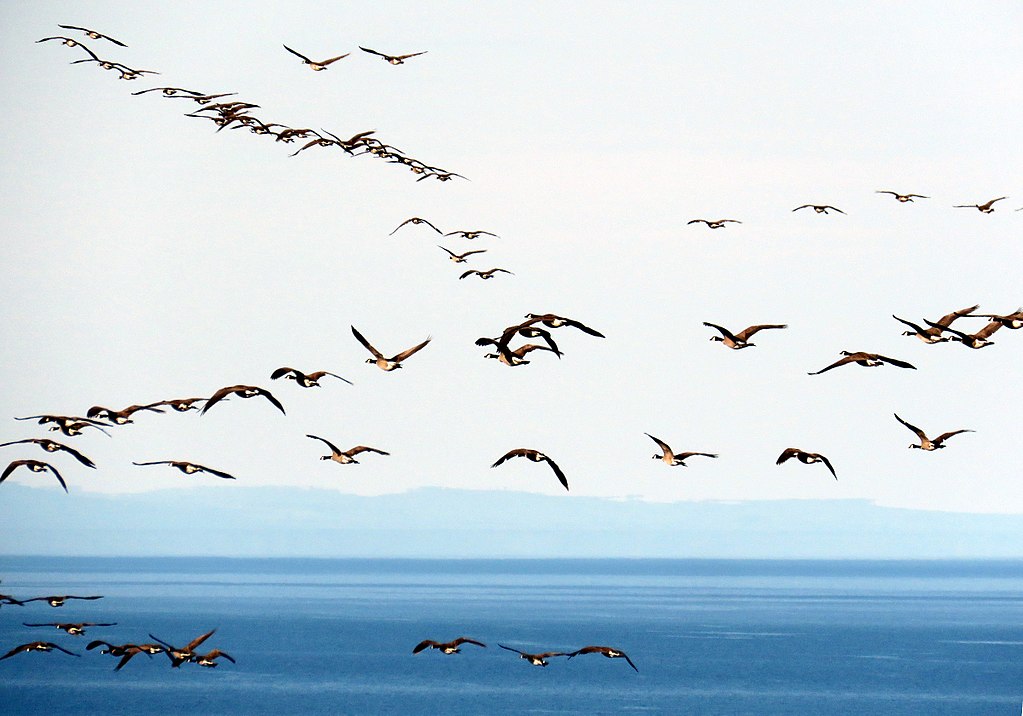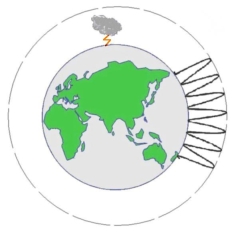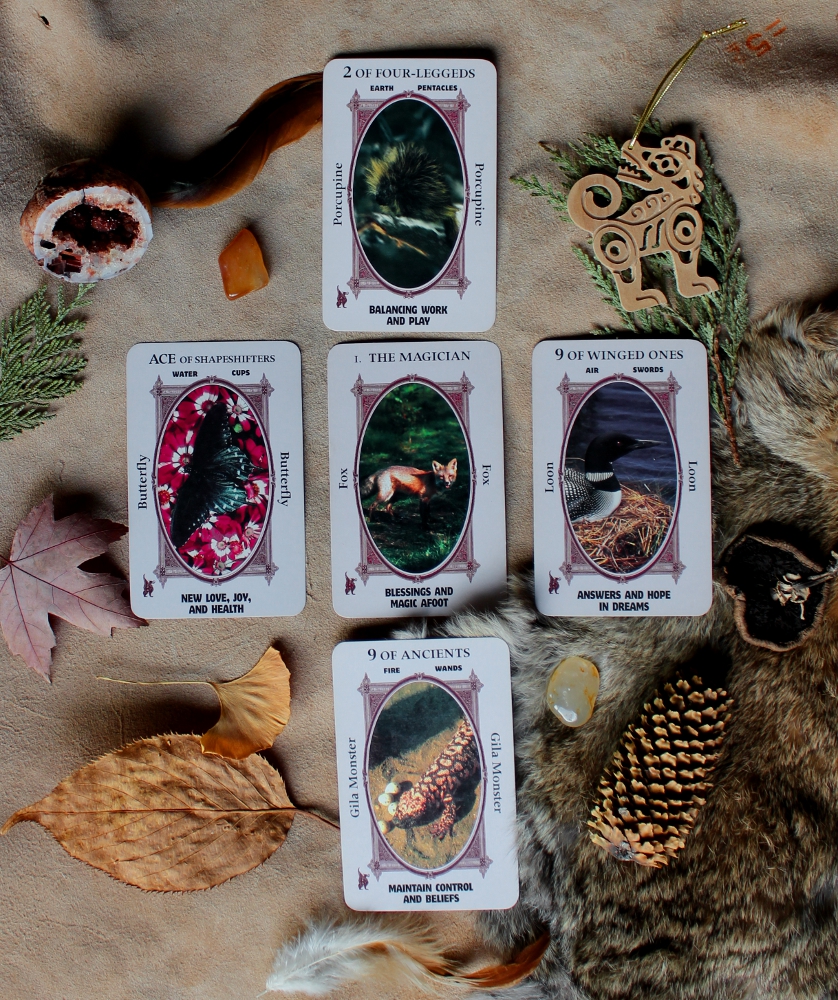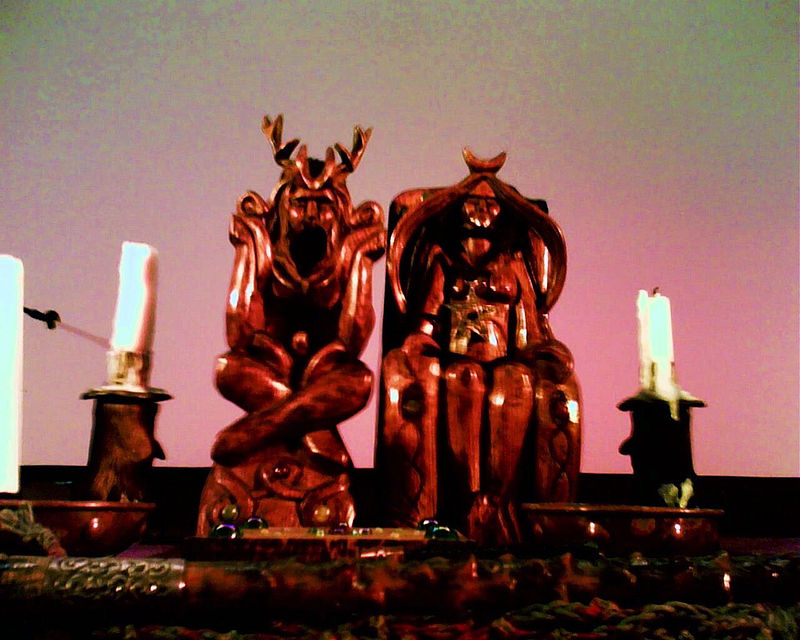I got to go to my very first Pagan Spirit Gathering earlier this year; between it and my second-ever Heartland Pagan Festival, I was strongly reminded of why I love Midwestern festivals. Both events had an appreciable roster of rituals throughout their time, but I was particularly impressed by the number of rites of passage at PSG. This isn’t surprising; after 36 years, the Circle Sanctuary organizers have had plenty of time to create a crucible for people to step from one stage of life to the next. There were rites for young people just entering their teens, and others for elders. Most of the rites of passage weregendered towards women or men (based on identity, not genes), though the Wild Hunt was an ordeal open to people of all ages and sexes (by necessity participants were chosen from a hat full of names since there wasn’t enough room for everyone who’d want to participate.)
While I was pretty busy with guest of honor activities, I did look into what would have been available to me if I’d had the time. I’m a woman in my mid-thirties, and my choices were:
–Motherhood Blessingway: a blessing for all women who were pregnant or had become mothers (to include through marriage or adoption) in the past two years. Nope, no kids here and no intention to have them, so that doesn’t fit.
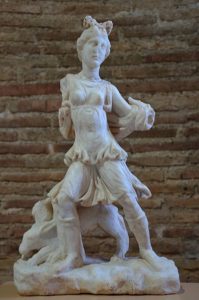 –Daughters of the Dark Moon: “a group of women past the Motherhood stage of life but who do not yet identify with the Crone stage of life”. Well, that’s only open to members of a particular online group that have been putting a lot of preparation into this ritual for the past year. No gate-crashing this time!
–Daughters of the Dark Moon: “a group of women past the Motherhood stage of life but who do not yet identify with the Crone stage of life”. Well, that’s only open to members of a particular online group that have been putting a lot of preparation into this ritual for the past year. No gate-crashing this time!
–A Circle for She Who is More than a Maiden but Not Yet a Mother: for women who have “left childhood far behind, but don’t yet have the responsibility of motherhood (literal or metaphoric)”, with some non-reproductive alternatives to Mother offered up for consideration. I really, really wanted to see what this one was all about, because I spoke briefly with people involved in it and it actually sounded awesome, but I had a workshop I had to teach at the same time.
MMCYWS as Limiting Factor
I am in no way faulting PSG for making some use of MMC imagery. Again, their attempt to have something for just about everyone was really impressive, and I know a lot of people who participated in the rites got a lot out of them. In fact, I think they should be a good model to other groups and events wanting to offer similar rites of passage.
But a LOT of pagans are still using what I consider to be a very limited and outdated model of human development: Maiden/Mother/Crone and Youth/Warrior/Sage* (which I will from here on out abbreviate as MMCYWS.) MMCYWS started out in Wicca as a way of viewing the Wiccan Goddess and her Consort in their various phases, but worked its way into the greater pagan community as a way to answer the lack of rites of passage for human beings in the United States and elsewhere. We celebrate things like getting your driver’s license or reaching legal drinking age, but it’s not usually a big community affair where you’re formally brought into a new stage of life by others who have already been there, done that, and who explain the responsibility not just as an individual but as part of the community. (Usually the meaning of these two rites is limited to “Wheee, now you can give your car-less friends rides!” and “CHUG CHUG CHUG!!!!!”)
The problem is that people are a lot more complicated than three phases and their rites of passage can account for. As you can tell from my personal experience, it’s not always easy to pigeonhole someone into one particular archetype. And we all have major shifts in our lives that have nothing to do with our age–for example, the ordination of new Circle Sanctuary ministers that is held at PSG each year. But MMCYWS is convenient for a general audience, isn’t it?
 Well, convenient, yes, but accurate? Not necessarily. Maiden/Mother/Crone is the older of the two triads; Youth/Warrior/Sage was added on later to have an analogue for men. These go back to the idea of the Goddess as the keeper of the Earth and plants and being receptively feminine, while the God is the lord of wild animals and hunting and virile masculinity. And MMC is dreadfully uterus-based, not surprising when you consider Wicca is a fertility religion, but still unacceptable when dealing with diverse, flesh and blood women who may not even have uteruses. Moreover, look at Youth/Warrior/Sage: those aren’t based on whether the guy had sex and made babies or not. They’re about roles within the community. MMC, on the other hand, is all about reproductive powers. “Maiden” either refers to a woman who has not has sex yet, or one who is unmarried. “Mother”, of course, is a woman who has children. A “Crone” is a woman who can no longer bear children because she’s hit menopause.
Well, convenient, yes, but accurate? Not necessarily. Maiden/Mother/Crone is the older of the two triads; Youth/Warrior/Sage was added on later to have an analogue for men. These go back to the idea of the Goddess as the keeper of the Earth and plants and being receptively feminine, while the God is the lord of wild animals and hunting and virile masculinity. And MMC is dreadfully uterus-based, not surprising when you consider Wicca is a fertility religion, but still unacceptable when dealing with diverse, flesh and blood women who may not even have uteruses. Moreover, look at Youth/Warrior/Sage: those aren’t based on whether the guy had sex and made babies or not. They’re about roles within the community. MMC, on the other hand, is all about reproductive powers. “Maiden” either refers to a woman who has not has sex yet, or one who is unmarried. “Mother”, of course, is a woman who has children. A “Crone” is a woman who can no longer bear children because she’s hit menopause.
My development as a person has had only tangential relationship to my physical body, particularly after my late teens/early twenties when my brain and body finished growing and developing. I remember my menarche, and I honestly felt it had less to do with my development as a person at the time than my confirmation as a Catholic a couple of years later. Everyone in eighth grade at my Catholic school was confirmed and brought more fully into the community of the church. It wasn’t about whether I could make babies or not, but how much I’d learned about the faith I was raised in. Sure, you could argue that because no one made a big deal out of my menarche of course I wasn’t going to see it as a rite of passage. But even back then when I was told “Well, now you can get pregnant”, I didn’t particularly care because motherhood just wasn’t something I ever wanted. And menarche celebrations are still just ways to say “You’re an adult now because of your reproductive powers.” They’re specifically tied to that one change in the physical body, no matter how else you dress it up.
And that’s my biggest gripe with MMC in particular: it still follows the dominant societal script for women of “You grow up, you get married, you have babies.” We’re surrounded by that message from a young age. I never had role models in my life who deliberately chose not to have children (but still had relationships), and there were no female characters in stories and shows who didn’t have children because that was what they wanted. (But there were plenty of male characters running around who didn’t have the “burden” of a wife and kids, and a few who had off-stage families who didn’t interfere in their adventures.) Most female characters were mothers or grandmothers, or were too young but were some guy’s love interest, or in a few cases were heartless shrews that no one would want to reproduce with in the first place. The few times childlessness was ever addressed it was through infertility, not choice.
And so as a childfree woman who has no intentions of changing that lifestyle, the Mother part of MMC is particularly frustrating, as even my spiritual community isn’t free of the ideal of women-as-baby-makers. I know that most women do end up having children, and I have no problem with them having blessingways and other rites–being a parent is a BIG change in one’s life, and it should be treated as a big deal. But why should the men have their middle phase be “Warrior” instead of “Father”, while women are universally stuck with “Mother”?
Possible Solutions?
There have been attempts to try to shoehorn every woman into the MMC model, particularly that persnickety Mother stage. “Oh, Motherhood isn’t just giving physical birth! It can mean nurturing other people’s children! Or nurturing creative projects, or careers!” Nurture, nurture, nurture! That’s what women do! But men aren’t said to be “nurturing” anything–they’re warriors. The message is clear: women nurture, men protect, even if they’re working on the same damned things. And that’s the issue: you’re still trying to work with a model that is based on outdated gender dichotomies that place women in gentle, passive, nurturing roles, and men in active, assertive, protective roles. That’s not to say that there haven’t been attempts to make rites of passage for women that include our more active, protective qualities, or rites for men that remind them that they, too, can be nurturing and gentle. But as long as we keep trying to uphold MMCYWS as the gold standard for pagan rites of passage, we’re going to keep running into the stark limitations that this model has.
That means I also don’t support the idea of turning the men’s triad into Youth/Father/Sage. Making BOTH triads dependent on one’s parenthood status doesn’t fix the problem. Instead, I want to see more community-based rites of passage that do away with MMCYWS entirely. I don’t mean get rid of gender-specific rites entirely (though they need to be open to everyone who identifies as that particular gender, not just women’s rituals for women with fully functioning uteruses as one example.) There’s something to be said for being able to explore how you feel as a person of your sex/gender and where your place is in the greater community, especially because we are gaining more freedom from the strict gender dichotomies of the dominant culture. But we need to stop trying to shove women into Maiden/Mother/Crone. And we need to stop trying to create a similar limiting analogue for men.
 So what do we do instead? Well, you can have rites of passage based on gender and/or age, but don’t limit them to MMCYWS. In fact, drop the archetypes entirely, and let the participants themselves inform what they feel they are growing into. Why does everything have to be shoved into labels anyway? I’ve seen people try to come up with alternative roles for the middle stage of MMC–Queen or Warrioress instead of Mother–but there’s still the uterus-based movement of Maiden into Middle Stage, and then Middle Stage into Crone.
So what do we do instead? Well, you can have rites of passage based on gender and/or age, but don’t limit them to MMCYWS. In fact, drop the archetypes entirely, and let the participants themselves inform what they feel they are growing into. Why does everything have to be shoved into labels anyway? I’ve seen people try to come up with alternative roles for the middle stage of MMC–Queen or Warrioress instead of Mother–but there’s still the uterus-based movement of Maiden into Middle Stage, and then Middle Stage into Crone.
And question what you feel you can teach boys and men that you can’t teach girls and women, especially for the boys and girls. Puberty is really when the different treatment of girls and boys gets into full swing, and girls often get the short stick when it comes to things like practical skills. My Girl Scout troop honestly sucked pondwater, because our meetings were mostly sitting in a basement singing songs and making woven potholders, while Boy Scouts my age were getting to go camping and learning how to build fires. (I even had a subscription to Boy’s Life magazine for a number of years because I just wasn’t getting to learn enough in my scouting “adventures”.) And while I’ve met a few women whose Girl Scout experiences were more active and adventurous, a lot of women had experiences similar to mine, because girls were supposed to do domestic things and not get dirty or do anything dangerous.
If your rites for boys and girls are different–WHY? What can you possibly teach boys that you can’t teach girls, other than how to approach the societal expectations that our dominant culture tries to shove on each group? And if your rites for grown men and women are different–WHY? If the men get to go off into the woods to have solitary vision quests, but the women are expected to stay in a circle and talk, why? Is it just a matter of different organizers with different ideas for rites in general, or is there gender-based bias going on? Even crones and sages–are the crones just talking about how much hot flashes suck, or is there a reason that all these elders aren’t celebrating their coming into elderhood together? I’m not saying don’t have gender division in these rites–but I AM saying to question the reasons why. Furthermore, question whether they’re necessary, and whether you’re bringing assumptions about the supposed differences between men and women into play. Having a group of crones-to-be talking about how society views older women and how to change that is one thing; treating the crones as geriatrics who might break a hip while letting the sages have one more adventure before settling down is another.
Beyond that, consider rites of passage that have nothing to do with one’s gender or sex. A few years ago I wrote about Bill Plotkin’s Wheel of Life as an ecopsychological alternative to MMCYWS. You’ll need to read his book Nature and the Human Soul to get the whole effect, but the short version is that it’s a gender-neutral eight-stage cycle of growth that is based less on physical changes, and more on psychological growth, and one’s relationship to both community and environment. There’s a lot of potential fodder for rite of passage inspiration.
And for pity’s sake, there are LOTS of pagan ritualists out there who have created some really amazing celebrations and transformations. Surely that wellspring of creativity can come up with something that doesn’t use MMCYWS. We’ve created incredible handfasting/wedding rites, funerary rites, baptisms, and other celebrations. I bet we can come up with other ways to mark important thresholds that don’t involve trying to pigeonhole human beings into limited gender roles.
To that end, I’d love to hear any experiences people have had with working beyond MMCYWS in rites of passage, particularly gender-based ones. I know you all are out there–I invite you to share in the comments!
* To be clear, PSG didn’t use the Youth and Warrior terms for the men’s rite of passage, nor the Maiden term for the young women’s rite. But Youth/Warrior/Sage still has a pretty strong influence on the pagan community, with Warrior/Father/Sage being a less common interpretation.
Like this:
Like Loading...


